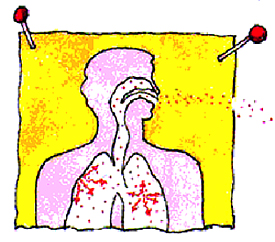
Phone (919) 844-5340
Contact
Us
Radon Information
Radon is a radioactive gas that has been found in homes all over the
United States. It comes from the natural breakdown of uranium in soil, rock
and water and gets into the air you breathe. Radon typically moves up
through the ground to the air above and into your home through cracks and
other holes in the foundation. Radon can also enter your home through well
water. Your home can trap radon inside.
Any home can have a radon problem. This means new and old homes, well-sealed
and drafty homes, and homes with or without basements. In fact, you and your
family are most likely to get your greatest radiation exposure at home. That
is where you spend most of your time.
Radon is a cancer-causing, radioactive gas.
You can't see radon. And you can't smell it or taste it. However, it may be a problem in your home. Radon is estimated to cause many thousands of deaths each year. That's because when you breathe air-containing radon, you can get lung cancer. In fact, the Surgeon General has warned that radon is the second leading cause of lung cancer in the United States today. Only smoking causes more lung cancer deaths. If you smoke and your home has high radon levels, your risk of lung cancer is especially high.
The Risk of Living With Radon
Radon gas decays into radioactive particles that can get trapped in your
lungs when you breathe. As they break down further, these particles release
small bursts of energy. This can damage lung tissue and lead to lung cancer
over the course of your lifetime. Not everyone exposed to elevated levels of
radon will develop lung cancer. And the amount of time between exposure and
the onset of the disease may be many years.
Like other environmental pollutants, there is some uncertainty about the
magnitude of radon health risks. However, because of studies, we know more
about radon risks than risks from most other cancer-causing substances.
Smoking combined with radon is an especially serious health risk.

Children have been reported to have greater risk than adults of certain types of cancer from radiation, but there is currently no conclusive data on whether children are at greater risk than adults from radon.
Your chances of getting lung cancer from radon depend mostly on:
-
How much radon
is in your home -
The amount of time you
spend in your home -
Whether you are a smoker
or have ever smoked
Devices Used:
Fernto-Tech CRM-510
Continuous Radon Monitors
Residential Radon Measurement Provider:
Bill Delamar
NEHA NHRP ID: 102897 RT
Services:
Standard and Analytical Services
Radon test reports are e-mailed, usually the same day they are picked up. They can also be faxed.